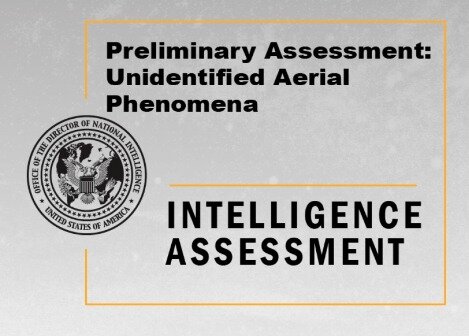Unidentified Aerial Phenomena (UAP) report June 2021
Revised September 2024
The highly anticipated UFO report on the Pentagon’s research into Unidentified Aerial Phenomena (UAP) was finally released to the public on June 25, 2021. A more detailed, classified version of the report was delivered to Congress on June 2.
The Senate Intelligence Committee included a passage in the COVID-19 relief bill in 2020 that required the Pentagon to publish its assessment of the UAP threat no later than Friday, June 25.
The nine-page report contains some details from the Pentagon’s UAP task force and assesses reports from the military between 2004 and 2021, the majority of which were released within the past two years after a new reporting system was implemented.
In June 2020, the Senate Intelligence Committee confirmed the existence of the Unidentified Aerial Phenomena Task Force within the Office of Naval Intelligence. A few months later, the Pentagon announced the task force, saying its aim was “to detect, analyze, and catalog UAPs that could potentially pose a threat to U.S. national security.”
The report says the limited high-quality reporting on unidentified aerial phenomena (UAP) hampered its ability to draw firm conclusions about the nature or intent of the cases assessed. A unique, tailored reporting process was required to provide sufficient data for the analysis of UAP events. As a result, the UAPTF concentrated its review on reports that occurred between 2004 and 2021, the majority of which are a result of this new tailored process to better capture UAP events through formalized reporting.
Most of the UAP reports probably represent physical objects, given that most were registered across multiple sensors, including radar, infrared, electro-optical, weapon seekers, and visual observation.
In a limited number of incidents, UAP reportedly appeared to exhibit unusual flight characteristics. These observations could be the result of sensor errors, spoofing, or observer misperception and require additional rigorous analysis.
There are probably multiple types of UAP requiring different explanations based on the range of appearances and behaviors described in the available reporting.
The report concludes that UAP clearly poses a safety of flight issue and may pose a challenge to U.S. national security. Safety concerns primarily center on aviators contending with an increasingly cluttered air domain. UAP would also represent a national security challenge if they are a foreign adversary that has developed either a breakthrough or disruptive technology.
The report was only able to confirm the identity of a single UAP out of 144 reports. “In that case,” the report says, “we identified the object as a large, deflating balloon. The others remain unexplained.” 18 incidents seemed to feature unusual flight patterns and 11 reports reported “near misses” with a UAP. In a small number of cases, military aircraft systems processed radio frequency (RF) energy associated with UAP sightings.
The report lists five possibilities for what the UAPs could be:
Flocks of birds or other “airborne clutter,” like plastic bags
Natural atmospheric phenomena
Top-secret US technology that the Navy and other agencies don’t know about. Officials were “unable to confirm” that any reported UAPs originated from secret government programs.
Foreign technology from foreign powers like Russia or China
Other explained causes
The report noted that cameras aboard military aircraft are specialized for tactical operations and aren’t suited for capturing the unidentifiable phenomena, hampering analysts’ ability to study sightings after they have been reported.
Read other UFO stories
Mysterious UFO phenomena begins to be acknowledged officially by the US Military
Exclusive articles for members of StrangeOutdoors that are not available elsewhere on the site.
See the list of Exclusive members-only articles on StrangeOutdoors.com


